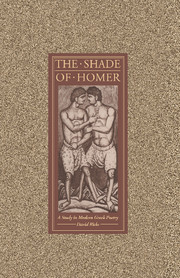Book contents
- Frontmatter
- Contents
- Acknowledgements
- Preface
- Introduction: Homer and the modern Greek poets
- PART ONE HOMER IN THE NEW GREECE: THE SPIRIT AND THE LETTER
- PART TWO SIKELIANOS
- PART THREE CAVAFY
- 7 Modes of misquotation
- 8 Ancient days
- 9 Homer into history
- PART FOUR SEFERIS
- Reflections
- Further reading
- References
- Index
7 - Modes of misquotation
Published online by Cambridge University Press: 04 August 2010
- Frontmatter
- Contents
- Acknowledgements
- Preface
- Introduction: Homer and the modern Greek poets
- PART ONE HOMER IN THE NEW GREECE: THE SPIRIT AND THE LETTER
- PART TWO SIKELIANOS
- PART THREE CAVAFY
- 7 Modes of misquotation
- 8 Ancient days
- 9 Homer into history
- PART FOUR SEFERIS
- Reflections
- Further reading
- References
- Index
Summary
‘Homer's world was another matter: it is not strange that he understood quite early on that he must leave it behind.’ Seferis' statement about Cavafy's relationship with Homer is probably one of the less disputed claims that the younger poet made about his senior, and it has not been made the subject of a detailed examination. Can we speak of a ‘Homeric world’ with reference to Cavafy as we undoubtedly can in the case of the early Sikelianos? For the rhetoric of autochthony is alien to Cavafy: outside the Greek state, and initially peripheral, as reader no less than as writer, to its modern literature, he has not the spirit of Homer on which to draw but the letter. (Because of Cavafy's relative isolation from earlier poetic developments in Greece and their implications for Homer, indeed, he appears here after Sikelianos in defiance of their dates of birth; it is to be noted, however, that Cavafy continues to revise one of his poems on Homeric themes, ‘The Funeral of Sarpedon’, as late as 1924, while the latest of the relevant poems of Sikelianos dates from 1915.)
Yánnis Dállas has remarked of the Greek Romantic period that it
remembered the ancestral deposits, the Byzantine and above all the ancient. It is to its credit. Its mistake was that it remembered them more or less as a foreigner – that is, like the nations of Europe – and without their substantial assimilation of them and returns gained from them.
- Type
- Chapter
- Information
- The Shade of HomerA Study in Modern Greek Poetry, pp. 85 - 90Publisher: Cambridge University PressPrint publication year: 1989

